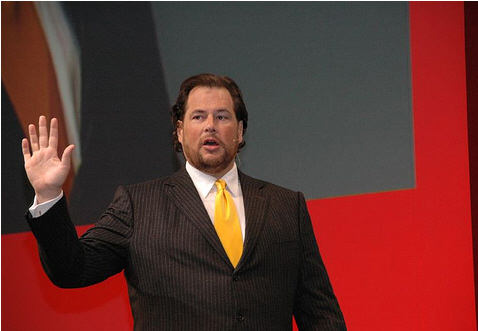Salesforce.com's platform ambitions

In 2000, Salesforce.com started selling a basic CRM solution delivered via the Internet. The company was swimming against the tide. Businesses, especially large enterprises, weren't disposed to giving up control of their applications and infrastructure to a startup with outspoken and sometimes bombastic CEO Marc Benioff, who proclaimed the "end of software."
When the company launched in Februrary 2000, Benioff said, "Our objective is to put Siebel Systems out of business." More recently, Benioff boasted, "We will destroy Oracle and SAP because they won't be able to respond to the innovation we are about to unleash."
Trash talking aside, in the eight years since salesforce.com was founded, the idea of software-as-a-service--or the "Business Web" concept as pioneered by Benioff's growing team and prodigious marketing efforts--has taken root. Benioff hasn't much tempered his verbal baiting of competitors, but with more than $500,000,000 in annual revenue, 27,100 customers and 500 applications in AppExchange (a directory of products that integrate with the salesforce platform--now called Apex), he no longer has to shout to be heard.

Benioff's latest weapon to compete with SAP, Microsoft and Oracle is Apex Code, a Java-like programming language that will allow developers to write directly to salesforce.com's servers. With the language, developers can create the kinds of hefty ERP and transactional applications that are the bread and butter of the big enterprise software providers, he said.
As an on demand service, salesforce.com eliminates the need for developers to muck with supporting or acquiring the complex infrastructure to serve up applications. Just as with Microsoft, SAP or Oracle, developers are locked into the platform, but cost and complexity are greatly reduced. Apex Code is just going into testing with customers, and will go into beta later this year.
Fundamentally, salesforce.com has morphed from a customizable, on demand CRM application to a full-blown development platform supplier. "We want a killer app to emerge from a third-party," Benioff said. "We don't want to do it all ourselves...we can't. It's better to aggregate the whole industry and go at development as a team effort, especially for an distributed environment like AppExchange."
The economics are also attractive, according to Benioff. "We can sell far more seats and at much higher margin over time. As a platform company, we can enter all markets. CRM is only one information management market; there is such a wide area of applications--ERP, custom, custom apps, agile apps. And, the cost and heavy lifting of building apps and the risk associated with developing each additional app for each market and geography is diminished. We share in the success but not in the risk, and the developer doesn’t have to take big risk investing in capital expenditures or taking venture capital money." He also touted the AppExchange and AppStore, which will provide merchandising, maintenance and software distribution services, as advantages for developers and customers.
I asked Benioff about his expectations for getting applications into the AppExchange that can compete with SAP's ERP suite, for example. He wasn't prepared to make a prediction and trotted out his stump speech: "We have to project out where its going to go. People overestimate what can be done in one year and underestimate what can be done in a decade. We don't want to see a barrier to entry for on demand software. Our fundamental premise is the 'end of software,' so we want to empower companies to compete with SAP, Oracle and Microsoft. That is our job."
However, Benioff also expects that companies who currently build applications on their own server platforms will write natively to the Apex platform. I asked him whether a company like SuccessFactors, which has an HR on demand application with more than 2 million subscribers, should write to the Apex platform, rather than just integrate with the salesforce CRM application through Web services. "I think it would be wise to natively support our platform and have a version on their's. There is no reason not to do both," he said. "I am sure their competitors will if they don't. It is cheaper to build it on our server, similar to Amazon with EC2. We do the heavy lifting...we have spent $100 million to get to the scale we have today."
A spokesperson for Successfactors said the the company has no current plans to develop an Apex native version of its software.
I also asked Benioff about competing with the very developers who he wants to build killer apps on his platform. "We have certain apps that we make, such as salesforce automation and customer service and support. With our new platform, we don’t have to be the only SFA provider. With our OEM Edition, developers can compete against us. On Windows, Microsoft makes a spreadsheet and other companies have spreadsheets. We want to have same open environment and to create competition.
Excel is not the best example of enabling healthy competition, given Microsoft's spreadsheet has somewhere in the neighborhood of 95 to 99 percent market share. Last year, salesforce.com acquired AppExchange products, such as Kieden, which manages Google-driven ad campaigns. Over time, what is in salesforce.com's self interest and that of developers will come into conflict.
At the end of the day, salesforce.com is competing for developer attention. The Oracle Technical Network has 5.2 million registrants. SAP has more than 100,000 600,000 members of its Developer Network. Microsoft's Developer Network is massive. Salesforce.com claims 25,000 developers, which would be about one per customer. "We feel it is our biggest issue in the company," Benioff told me. In typical fashion, he thinks big: "We have to get to 5 million as fast as possible."